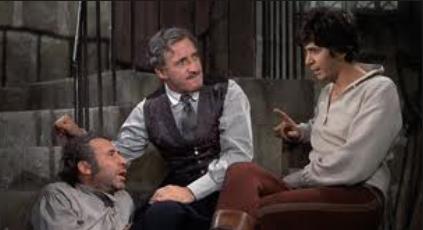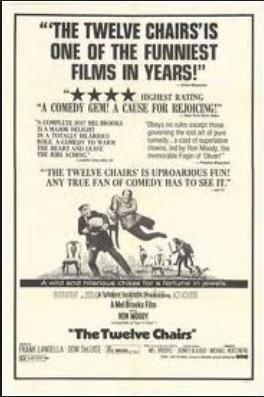|
Tonight (Wednesday), TCM will be broadcasting perhaps the least-known (and one of the two best) of Mel Brooks' comedies, the wonderful The Twelve Chairs. If you haven't seen it, set your DVR. It starts at 6:30 PM in Los Angeles, and so I assume 9:30 PM in the the East. And if you have seen it, revel in it again. It's all personal opinion, of course, and it's hard for me to say that The Twelve Chairs is better than The Producers. The Producers is simply too hilarious to suggest otherwise. But I think that The Twelve Chairs is the best-made of Mel Brooks's movies -- the best acted overall, the best written, the best structured, and the best directed and produced. It stars Ron Moody (not long after getting his Oscar nomination as Best Actor for 'Fagin' in the movie musical Oliver!), Frank Langella (at the peak of his popularity, after having starred in the Broadway play and film version of Dracula), and Dom DeLuise, in perhaps his best performance. Mel Brooks is in it, as well, but in a very small supporting role as a former slave peasant, and it's probably his funniest performance, as well. The movie is also not a pure comedy per se, but dramatic in parts and very touching (something hardly typical for what became known as A Mel Brooks Film), with a great deal of social commentary. In fact, The Twelve Chairs is the only Mel Brooks movie that's based on another source. In this case it's the Russian novel by Ilf and Petrov. The writers Ilf and Petrov were unique -- the best way to describe them is sort of as the Russian version of Mark Twain. They were satirists, not the most common or safest of professions in the early days of the Soviet Union -- or the later days -- and hugely popular. In fact it's their massive popularity that kept Soviet officials hands-off. The first story I read by Ilf and Petrov was The Fatal Egg, a very funny short story about a lab experiment with an egg that starts off with the best of intentions that gets wildly out of control and goes all wrong. It's clear when reading it that the "experiment" they're talking about is Communism. The fact that, with stories such as that, Ilf and Petrov were allowed to keep writing is testament to their extreme popularity. The Twelve Chairs is about the change from Mother Russia to Communism after the Revolution, and it's no less satirical and scathing, all round. It tells the story of former nobleman Ron Moody (as Vorobyaninov) who's struggling and unable to deal with the new world of equality brought by the Revolution. Then, as his mother is dying, she whispers to him that before the Revolution, she sewed all the family jewels into the seat of one of their twelve chairs that have since been taken off -- somewhere. The thing is, she has confessed all this to her priest, played by Dom DeLuise, who opts for financial gain over piety, and like Moody decides to go off and track the chairs down. And Moody's quest to find the chairs (amid Soviet bureaucracy, since the full set of 12 has been split up) gets him teamed with a charming thief, played with incredible grace by Frank Langella. Their competing greedy quests take them across the country, and the concept of rank, position and friendship all begin to overap. As you can see, this is hardly the typical Mel Brooks comedy. It's also perhaps the direction of movies that Brooks had planned to take. But the movie was a huge failure at the box office. And even his first film, The Producers, hadn't been especially successful. But his next movie, Blazing Saddles, was a massive hit. So, from that point on, he only made movie parodies. I liked many of them, was disappointed in too many, as they got progressively worse, and would have loved to have seen how his film might have been, because I loved The Twelve Chairs so much. The movie also gave an indication of what was to come in another regard, and not necessarily for the best. As I mentioned, Mel Brooks is hilarious in a very small role as a former slave, Tikon, now just a peasant, who longs for the days of security, even if he was treated poorly by his master, Ron Moody, who he loved. You'll recall that Brooks didn't appear in his first film, The Producers. And he just gave himself a tiny role here. But a few years later, I heard an interview with him saying, "If I'd known how funny I'd be in The Twelve Chairs, I'd have made the part bigger." Though it might have been fun to see more of him here, sometimes less and wanting to see more works best. More to the point, he did give himself a bigger role in his next film, Blazing Saddles (a double role, in fact, as the governor and an Indian chief). And then after Young Frankenstein, which he made with Gene Wilder who starred, Brooks began making himself The Star. I like Mel Brooks as an actor -- but I think he's best as a character actor and in supporting roles. I'm not convinced he did his movies justice by starring in all of them. (As you'll note here by how wonderful the acting is in The Twelve Chairs with Moody, Langella and DeLuise.) But his being so wonderful in The Twelve Chairs started that path, I think. One last tidbit of note. I absolutely the song over the opening credits, "Hope for the Best, Expect the Worst." It's one of Mel Brooks' best. The number sets up the movie perfectly, with great lyrics and music.
Hope for the best, expect the worst. The rich are blessed, the poor are cursed. Go take your chances There are no answers. Hope for the best, expect the worst. And you'll see the screen credit as -- "by Mel Brooks." Except...it's not. The music is almost exactly note-for-note Brahms Hungarian Dances #2. (Which is itself adapted from old Hungarian folk songs.) While I can understand the desire to take full credit yourself, and the original work for far out of copyright, I think it would almost be a more wonderful credit to have, "Lyrics by Mel Brooks, Music by Johannes Brahms." Plus, it would have been honest. Anyway, do yourself a favor and check out The Twelve Chairs today.
2 Comments
Doug Abramson
7/24/2013 12:38:07 pm
I agree with you regarding where The Twelve Chairs fits into Brooks' filmography and that he eventually reached the point of diminishing returns. (I'm always shocked to hear people say that they love Men in Tights) As for his acting, I think that he was only bad in Spaceballs and Men In Tights.(I've never seen Life Stinks) and that he was very good in High Anxiety, History of the World, To Be or Not to Be (I know, the Benny version was better), and Dracula: Dead and Loving It. Of course he was the only thing in that film that was any good. He wasted one hell of a cast. Back to The Twelve Chairs; I've always wondered why he didn't adapt it to Broadway as his Producers follow up. It has a better plot than Young Frankenstein and would be able to connect with more of the audience's emotions. I've never seen the stage version of Young Frankenstein, so I can only go by the reviews and some internet chatter and assume that it isn't very good.
Reply
Robert Elisberg
7/24/2013 01:32:09 pm
To be clear, I think Mel Brooks is a very good comic actor. I just think he's a better supporting actor than Movie Star. Think of his best movies -- The Producers, The Twelve Chairs, Blazing Saddles and Young Frankenstein. And what they all have in common is that Mel Brooks didn't star in them. But he was wonderful in the supporting roles. I think he let his ego get in the way, and also he saw Woody Allen starring. But Woody Allen had the sense to eventually let others star in his movies, and often took lesser roles, or no roles at all.
Reply
Leave a Reply. |
AuthorRobert J. Elisberg is a political commentator, screenwriter, novelist, tech writer and also some other things that I just tend to keep forgetting. Feedspot Badge of Honor
Archives
June 2024
Categories
All
|
|
© Copyright Robert J. Elisberg 2024
|








 RSS Feed
RSS Feed